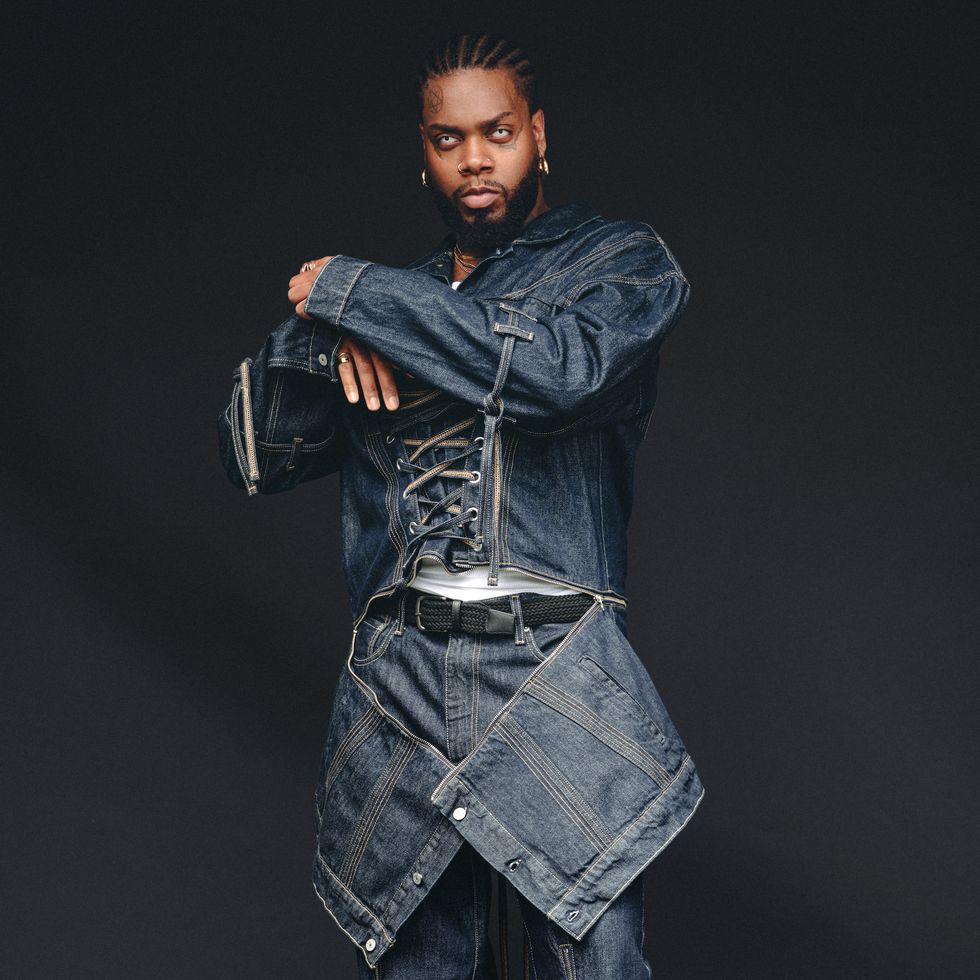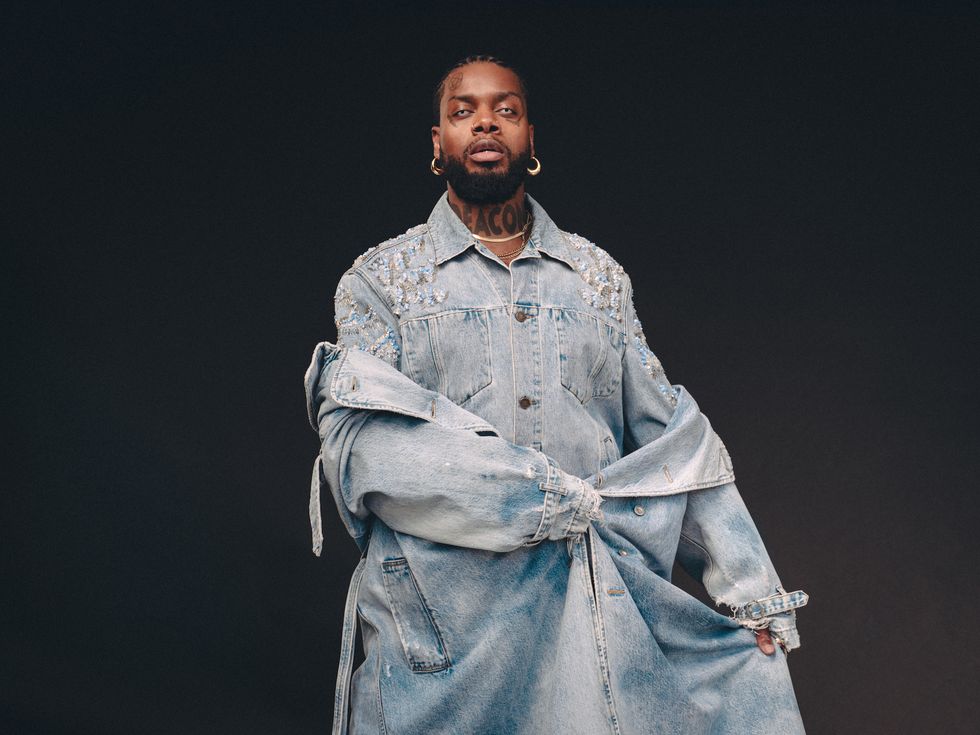
serpentwithfeet's 'GRIP' Is a Club Culture Musical
By Tobias Hess
Feb 28, 2024“I'm interested in how strangers become familiar with each other. [How they] tether themselves to each other,” serpentwithfeet (Josiah Wise) tells me over a glass of tart hibiscus tea on a chilly New York afternoon. His album GRIP had just come out a few days prior, and the singer, producer and recently minted theatrical artist is reflecting on all the ways that the club can be a space for connection, for curiosity, for abandon, for community.
“I think there's something really powerful about going to a club with friends when you know there are going to be hundreds of other people also coming to the club with friends. Nobody is coming to the club like, ‘I hope I have a terrible time,’” Wise says. “When you charge a space, what happens?” Alluding to a crystal, which can be “charged” with energy and manifestation, he notes that a club, too, can vibrate to that higher frequency of intentionality: everyone in the same dark room, moving, with similarly aligned dreams for the evening. What fills the air? What sparks are made manifest by two dancing bodies that touch?

Wise has already explored the vast bounds of human connection through two albums and a debut EP, 2016’s Blisters, which introduced the Baltimore-born artist as one of our greatest rising talents. His voice is both slippery and precise, forceful but with grace and showcase his symphonic vocal ability. His debut album soil and its followup, Deacon, expanded his sonic universe, with lush production that wove disparate musical strands together — gospel, classical, R&B, pop to name just a few. GRIP is both a further expansion of his sound and a pairing down. There’s a minimalism and clarity to the album. Where past work sought to present a sweeping feeling, GRIP instead holds one simple urge. It's the spark you feel when you catch someone's eye at the club, the purity and chaos of what that connection can grow into, on the dance floor, outside for a cigarette, in the Uber home and finally in bed.
The album was written in tandem with his theater show, Heart of Brick, which is about Wise "and a character named Brick, a bouncer, club owner [and] their love story” during the course of one night at a queer club. Co-written with poet Donte Collins, with choreography by Raja Feather Kelly and direction by Wu Tsang, the theater piece was a masterclass for the musician in storytelling and theatrical world-building. “It was definitely a collective effort,” he says. “I came up with the idea and beats and they really helped shape and ground it.” Those “beats” key us into the push and pull between Wise and Brick as the play’s chorus, fellow Black, queer club attendees charmingly comment upon their love story.

Though GRIP was written with the stage piece in mind, the music doesn’t read as overtly mechanistic or narrative. The songs serve the story, but they are not necessarily telling it. This allows for the “beats” in the narrative to unfurl as wider rumination rather than mere plot points, which suits the bleary dreams a night at the club can inspire.
“I think there's something about going to a place where you are a little bit more vulnerable. People are often looking for that soft connection,” Wise tells me, referring to the romantic magic of club nights. “If you're standing still, people notice. If you're dancing, people notice. You are visible in this confined space where there's music and stimuli. How are you going to respond? All the lights are on you. How do you show up?” he asks. “I think that sort of vulnerability leads to not just romantic connections, but platonic connections with friends and homies.”
All the magic that encircles those are made manifest in the album’s 10 tracks. “If we keep on dancing we gon’ make love/ hold you closer, closer than those damn gloves” he sings on album-opener “Damn Gloves,” a syncopated spiral built off a bed of 808s, a snakey synth line and with vocals from chart-topping artist Ty Dolla $ign and South African singer Yanga Yaya. Other songs, like “Safe Word” and “1 to 10,” trade the hedonism of the dance floor for the softness of the back alley make-out. “Hummin” and “Deep End” move with a sumptuous bounce, rooting us in a moving, desiring feeling.

The sound feels more in conversation with pop music than serpentwithfeet's previous albums, inspired by the churning sonics of the club, but also by what Wise is listening to. “I'm still a young person," he says. "There's so much great music out that I love. I want to be in conversation with that as well, with the music that's out that I love. I just wanted to figure out my way of doing that.”
“I want the music to feel kinetic. I just want to feel physical,” he says. It certainly does, and, as one hears his signature croons atop pulsating beats, it’s hard to not move. It’s hard not to “yearn.”
“The funny joke I've seen online is ‘serpentwithfeet makes music for the yearners,’ which I think is really accurate,” he laughs. “I am not not too proud to desire,” he states plainly. “I'm not too proud to express interest. I love the promise of new love. I love the promise kept of love that is endured.”
Photography: Denzel Golatt
From Your Site Articles
Related Articles Around the Web
MORE ON PAPER
ATF Story
Madison Beer, Her Way
Photography by Davis Bates / Story by Alaska Riley
Photography by Davis Bates / Story by Alaska Riley
16 January
Entertainment
Cynthia Erivo in Full Bloom
Photography by David LaChapelle / Story by Joan Summers / Styling by Jason Bolden / Makeup by Joanna Simkim / Nails by Shea Osei
Photography by David LaChapelle / Story by Joan Summers / Styling by Jason Bolden / Makeup by Joanna Simkim / Nails by Shea Osei
01 December
Entertainment
Rami Malek Is Certifiably Unserious
Story by Joan Summers / Photography by Adam Powell
Story by Joan Summers / Photography by Adam Powell
14 November
Music
Janelle Monáe, HalloQueen
Story by Ivan Guzman / Photography by Pol Kurucz/ Styling by Alexandra Mandelkorn/ Hair by Nikki Nelms/ Makeup by Sasha Glasser/ Nails by Juan Alvear/ Set design by Krystall Schott
Story by Ivan Guzman / Photography by Pol Kurucz/ Styling by Alexandra Mandelkorn/ Hair by Nikki Nelms/ Makeup by Sasha Glasser/ Nails by Juan Alvear/ Set design by Krystall Schott
27 October
Music
You Don’t Move Cardi B
Story by Erica Campbell / Photography by Jora Frantzis / Styling by Kollin Carter/ Hair by Tokyo Stylez/ Makeup by Erika LaPearl/ Nails by Coca Nguyen/ Set design by Allegra Peyton
Story by Erica Campbell / Photography by Jora Frantzis / Styling by Kollin Carter/ Hair by Tokyo Stylez/ Makeup by Erika LaPearl/ Nails by Coca Nguyen/ Set design by Allegra Peyton
14 October




